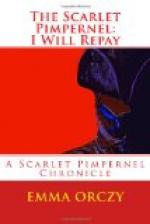He would not owe his life to her.
That was the one overwhelming thought in her, which annihilated all others. His love for her was dead, and he would not accept the great sacrifice at her hands.
Thus these two in the supreme moment of their life saw each other, yet did not understand. A word, a touch would have given them both the key to one another’s heart, and it now seemed as if death would part them for ever, whilst that great enigma remained unsolved.
The Public Prosecutor had been waiting until the noise had somewhat subsided, and his voice could be heard above the din, then he said, with a smile of ill-concealed satisfaction:
“And is the court, then, to understand, Citizen-Deputy Deroulede, that it was you who tried to burn the treasonable correspondence and to destroy the case which contained it?”
“The treasonable correspondence was mine, and it was I who destroyed it.”
“But the accused admitted before Citizen Merlin that she herself was trying to burn certain love letters, that would have brought to light her illicit relationship with another man than yourself,” argued Tinville suavely. The rope was perhaps not quite long enough; Deroulede must have all that could be given him, ere this memorable sitting was adjourned.
Deroulede, however, instead of directing his reply straight to his enemy, now turned towards the dense crowd of spectators, on the benches opposite to him.
“Citizens, friends, brothers,” he said warmly, “the accused is only a girl, young, innocent knowing nothing of peril or of sin. You all have mothers, sisters, daughters—have you not watched those dear to you in the many moods of which a feminine heart is capable; have you not seen them affectionate, tender, and impulsive? Would you love them so dearly but for the fickleness of their moods? Have you not worshipped them in your hearts, for those sublime impulses which put all man’s plans and calculations to shame? Look on the accused, citizens. She loves the Republic, the people of France, and feared that I, an unworthy representative of her sons, was hatching treason against our great mother. That was her first wayward impulse—to stop me before I committed the awful crime, to punish me, or perhaps only to warn me. Does a young girl calculate, citizens? She acts as her heart dictates; her reason but awakes from slumber later on, when the act is done. Then comes repentance sometimes: another impulse of tenderness which we all revere. Would you extract vinegar from rose leaves? Just as readily could you find reason in a young girl’s head. Is that a crime? She wished to thwart me in my treason; then, seeing me in peril, the sincere friendship she had for me gained the upper hand once more. She loved my mother, who might be losing a son; she loved my crippled foster-sister; for their sakes, not for mine—a traitor’s—did she yield to another, a heavenly impulse, that of




